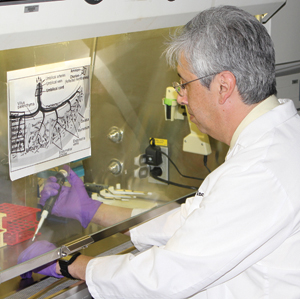By Celine Klosterman

The John Paul II Medical Research Institute (JP2MRI) and Cellular Engineering Technologies (CET) have partnered to develop a private stem-cell biobank in Coralville.
Scientists at CET are working to create a bank of more than 5,000 patient and disease-specific stem cell lines and other human cell lines. Pharmaceutical companies purchase those cell lines to test drugs on; academic and government institutions also buy the cells for research. These cell lines are derived from adult sources and do not include embryonic stem cells.
Embryonic-stem cell research requires destroying human embryos and is thus immoral, according to Catholic teaching.
“Adult stem cells represent a more reasonable and human method for making correct and sound progress,” according to the Pontifical Academy for Life’s “Declaration on the Production and the Scientific and Therapeutic Use of Human Embryonic Stem Cells.”
At CET in Coralville, scientists extract, purify and grow cells from human blood or tissue. JP2MRI, based in Iowa City, recruits patients and doctors in private practice to donate such tissue for research.
A ‘new paradigm’
Alan Moy, founder of the nonprofit institute and co-founder of CET, sees a stem-cell biobank as an opportunity to speed up medical research and drug discovery.
“It takes 10 years and $1 billion to get a drug to market, and the success rate for any drug in a clinical trial is pretty poor,” said Moy, a member of St. Mary Parish in Iowa City. A study covering the years 2004-10 found the overall success rate for drugs moving from early stage Phase I clinical trials to FDA approval is about one in 10, Reuters reported in 2011.
Even drugs that receive approval don’t work in all patients, he noted. “We need a new paradigm.”
Moy’s vision
Testing drugs on cells from patients has two benefits, according to Moy. First, it means researchers don’t have to spend as much time testing the drugs on lab animals. Second, it offers researchers a better idea of how to design a clinical trial on people, thus reducing the trial’s cost and length.
“Everyone benefits – the animal-rights advocates, the government, pharmaceutical companies, patients,” he said.
For such reasons, government and academic institutions are pursuing stem-cell biobanks. But those institutions face red tape and bureaucracy that a private biobank in Coralville can avoid, Moy said.
“The institute has launched its Give Cures program that has created a network of doctors in several private clinics and hospitals around the country to recruit patients to procure tissue to create the stem cell lines,” said Jay Kamath, CEO of JP2MRI. “The program is currently recruiting patients with genetic diseases, cancer and disorders like Alzheimer’s and Parkinson’s disease.”
Motivated by ethics
JP2MRI was formerly known as the John Paul II Stem Cell Research Institute. Its new name reflects the institute’s support of research using more than just adult stem cells, such as cancer cells. Also, the current name avoids the negative connotations that some critics of embryonic stem cell research associate with the term “stem cells,” Moy said.
Blessed John Paul II, the institute’s namesake, wrote the apostolic letter “Novo Millennio Ineunte” warning that scientists must avoid “discriminating between one life and another and ignoring the dignity which belongs to every human being.”
That ethical command motivates Kim Lehman, director of the ongoing Give Cures campaign for JP2MRI. Before accepting her position with the institute, she asked Moy, “’Why are you doing this?’ He paused and said, ‘Kim, when I stand before God, I’ll have to account for how I used my gifts.’ I said, ‘That’s a good reason; that is why I do what I do,’” recalled Lehman, then president of Iowa Right to Life.
She noted JP2MRI supporters can still visit www.givecures.org to donate or to download a Give Cures flyer to share. People also may pray in solidarity with the campaign’s prayer team.
Those suffering from diseases can visit www.jp2mri.org to sign up for a registry of patients willing to donate tissue –such as a small piece of skin, fat, blood or discarded cancer tissue – for research.
For more information, call Lehman at (515) 202-2517.








